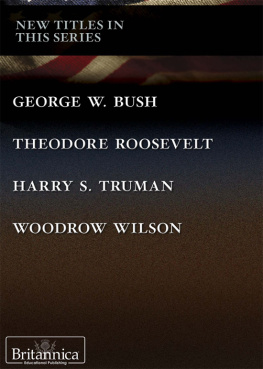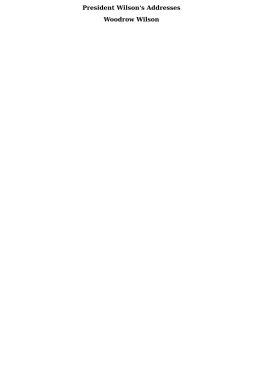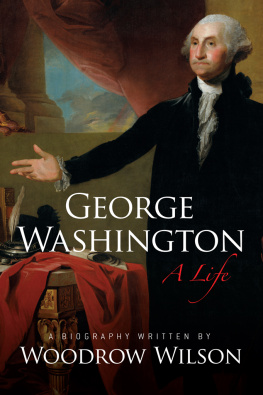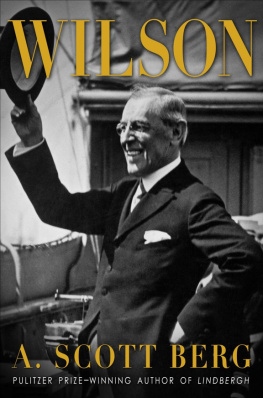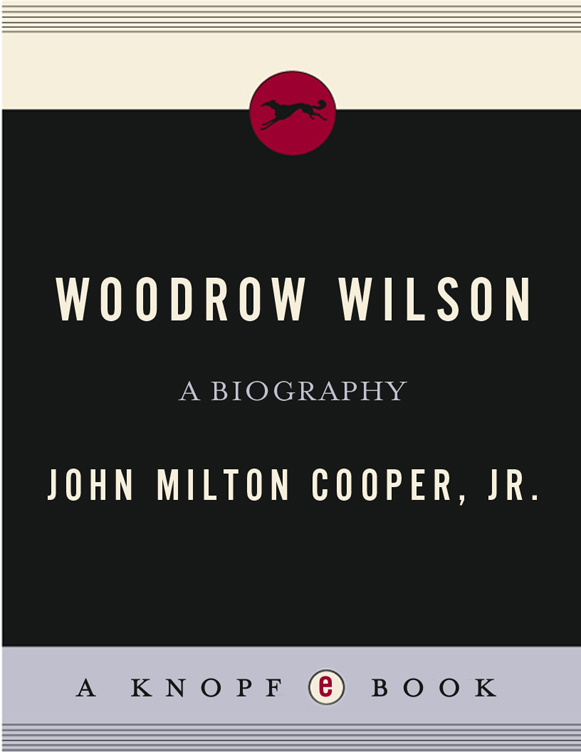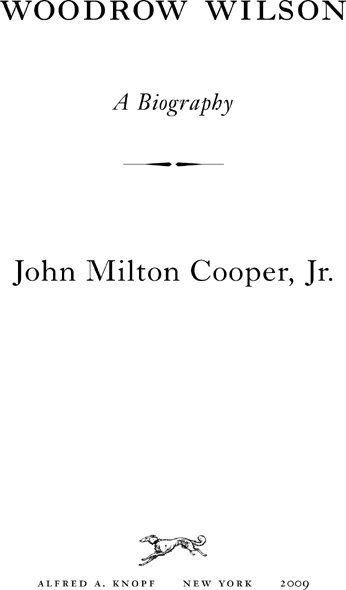ALSO BY JOHN MILTON COOPER, JR .
PROLOGUE

THIS MANS MIND AND SPIRIT
Each year, in the morning on December 28, a military honor guard carrying the American flag presents a wreath that bears the words The President. Accompanying the honor guard are members of the clergy, who carry a cross and say a prayer. The clergy are present because the wreath-laying ceremony takes place in front of a tomb in the Washington National Cathedral. Since the day is only a week after the winter solstice, the low angle of the morning sun causes bright colors from the stained glass windows to play across the floor of the alcove where the tomb is located, over the stone sarcophagus, and on the words carved on the walls. The alcove contains two flags, the Stars and Stripes and the orange and blackshielded ensign of Princeton University. The wreath laying takes place on the birthday, and at the final resting place, of the thirteenth president of Princeton and twenty-eighth president of the United States, Woodrow Wilson.
The ceremony and the tomb capture much about this man. The military presence is fitting because Wilson led the nation through World War I. The religious setting is equally fitting because no president impressed people more strongly as a man of faith than Wilson did. His resting place makes him the only president buried inside a church and the only one buried in Washington. The university flag attests to his career in higher education before he entered public life. Wilson remains the only professional academic and the only holder of the Ph.D. degree to become president. The inscriptions on the alcove walls come from his speeches as president and afterward. Wilson made words central to all that he did as a scholar, teacher, educational administrator, and political leader; he was the next to last president to write his own speeches. No other president has combined such varied and divergent elements of learning, eloquence, religion, and war.
Despite his deep religious faith, he did not go to war in 1917 because he thought God was telling him to do it. When someone telegraphed him to demand, In the name of God and humanity, declare war on Germany, Wilsons stenographer wrote in his diary that the president scoffed, War isnt declared in the name of God; it is a human affair entirely. To Wilson, as an educated, orthodox Christian, the notion that any person could presume to know Gods will was blasphemy. Likewise, as someone born and raised in the least evangelical and most God-centered of Protestant denominations, the Presbyterian, the notion of a personal relationship with the Almighty was foreign to him. Three months after the outbreak of World War I in Europe and at a time when he was enduring agonies of grief after the death of his first wife, he told a YMCA gathering, For one, I am not fond of thinking about Christianity as a means of saving individual souls.
Wilson practiced a severe separation not only between church and state but also between religion and society. Unlike his greatest rival, Theodore Roosevelt, he never compared politics with preaching. Unlike the other great leader of his Democratic Party, William Jennings Bryan, he never supported the greatest moral reform crusade of their timeprohibition. Also unlike Bryan, he saw no conflict between modern science and the Bible, and he despised early manifestations of what came to be called Fundamentalism. By the same token, however, he had little truck with the major liberal religious reform movement, the Social Gospel. Wilson remained a strong Presbyterian, but his second wife was an Episcopalian who continued to worship in her own church. He was the first president to visit the pope in the Vatican. He counted Catholics and Jews among his closest political associates, and he appointed and fought to confirm the first Jew to the Supreme Court, Louis D. Brandeis.
A person with that kind of religious background and outlook could never be either of the two things that many people would charge him with beinga secular messiah or a nave, woolly-headed idealist. Wilson was bold, extremely sure of himself, and often stubborn, and he did think of himself as an instrument of Gods will. But according to his beliefs, every person was an instrument of Gods will, and even his own defeats and disappointments were manifestations of the purposes of the Almighty. Such an outlook left no room for messianic delusions. It did leave room for idealism, but that did not distinguish him from the other leading politicians of his time. Except for a few crass machine types and hard-bitten conservatives, all the major figures in public life during the first two decades of the twentieth century proclaimed themselves idealists. Roosevelt and Bryan did so proudly, and nothing infuriated Roosevelt more than to hear Wilson called an idealist. Moreover, this was, as Richard Hofstadter characterized it, the age of reform. Prohibition, woman suffrage, anti-vice campaigns, social settlement houses, educational uplift, and an embracing set of political movements loosely gathered under the umbrella of progressivism were the order of the day. In that context, Wilson came off as one of the most careful, hardheaded, and sophisticated idealists of his time.
His circumspection extended to foreign as well as domestic affairs. By his own admission, he did not enter the White House with much of what he called preparation in foreign affairs. As a scholar, he had studied and written almost exclusively about domestic politics, and the only office he had held before coming to Washington was a state governorship. Even before the outbreak of World War I, two years into his presidency, he began to deal with problems abroad, particularly fallout from the violent revolution next door in Mexico. Wilson had to learn diplomacy on the job, and he made mistakes, particularly in Mexico, where he originally did harbor some facile notions about promoting democracy. He learned hard lessons there, which he applied later in dealing with both the world war and the Bolshevik Revolution in Russia.
Like others at the time, Wilson invested American intervention in the
Wilsons most renowned policy statement, the Fourteen Points, addressed specific problems of the time as much as larger conditions. Half of the points addressed general matterssuch as open covenants of peace, freedom of the seas, and an international organization to maintain peace, all carefully couched as aims to be pursued over time. The other half dealt with specific issues of the warsuch as the restoration of Belgium, an independent Poland, the integrity of Russia, and the matter of autonomybut not necessarily in specific termsso, for example, there is no mention of independence for subject peoples of the Austro-Hungarian and Ottoman empires. Wilsons moral authority and Americas lesser taint of imperialism made the soberly stated Fourteen Points a rallying ground for liberals and progressives throughout the world, but if he could have heard the ways later generations would use Wilsonian as an epithet to scorn nave efforts to spread democracy in the world, he might have echoed Marxs disclaimer that he was no Marxist, just Karl Marx: he was no Wilsonian, just Woodrow Wilson.


